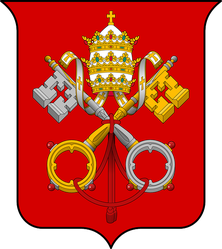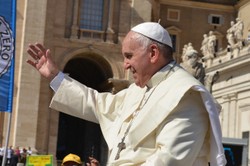There is an Italian saying, "After a fat pope a thin one." The meaning of this is that a new pope compensates for the weaknesses of his predecessor. Well, Francis, like Benedict,possesses a Ph.D.in Theology and graduate qualifications in psychology,literature and philosophy, but he lacks the theological expertise of his predecessor. Nor does he have the facility in languages of John Paul. His expertise is in leading institutions, and behind him he has the experience of being in charge of the Jesuit order in Argentina during the dictatorship, during which time he smuggled out people in danger of death out of the country. He later headed a theological college that trained priests, and then became archbishop of Buenos Aires. During this period he reformed the training of clergy by eliminating unsuitable candidates. In this facility with institutions he compensates for Benedict's limitations, though it is said that he will consult his predecessor on theological matters.
Francis has weighed into institutional reforms with gusto. I do not foresee that there will be much theological development during this papacy, for this is what the church does not need. What it needs is institutional reform, and this is what Francis will give it.
One significant reform is the new council. To compensate for the dominating influence of the Curia, the Vatican civil service/bureaucracy, which has had a stranglehold on information and advice reaching the papacy,the present pope has established an eight person council to advise him. This council consists of cardinals representing different areas of the world. North,Central and South America are represented, as are Asia, Europe, Africa and Australia. There is one representative of the Curia, who is European. These eight people advise on change in the church, and the function of this group is to counter the deadening effect of the papal bureaucracy.
Other institutional changes have been made. For the first time women have been admitted to roles in the curia, and the pope has stated that the church needs the talents of women. But the more difficult changes were with the Vatican bank. The bank had been regarded as a conduit for the criminal money, which was flowing through it because of its inadequate organisation. This is due to the simple fact that priests don't make the best financiers, as they are not trained in financial matters and their skill set does not include handling large amounts of money. This reform, conducted in the teeth of bank opposition, has attempted to turn a failing bank into an institution that brings credit rather than disrespect on the church. It involved getting some people out and other,reliable ones into post.
Furthermore, the pope has retired some senior curial officials who were either no longer up to the job because of age or because he was dissatisfied with their performance. This has made him some enemies. These changes involved his making a thorough study of Vatican personel, all of which was in addition to the routine work of pope, which involve not only addressing Catholic visitors to the Vatican and diplomats from across the world, but also personally meeting every Catholic bishop in the world in an ad limina visit once every three years.
But effecting these reforms is in addition to a a little known aspect of the Vatican's work, which sucks up much of the pope's time: the Vatican's work to prevent war. Since 1945 Vatican diplomacy has been committed to preventing nuclear war and international conflict, and the pope is at the heart of all these diplomatic efforts. A little known and under-appreciated job, but a vital one of world wide significance.













 Darkness over the Earth the skies darkened when Jesus was crucified22 days ago
Darkness over the Earth the skies darkened when Jesus was crucified22 days ago
 TheThousand Year Gardenon 11/26/2025
TheThousand Year Gardenon 11/26/2025
 Women of the Gospelson 10/11/2025
Women of the Gospelson 10/11/2025
 Religious Gardenson 08/25/2025
Religious Gardenson 08/25/2025



Comments
Yes, that is what I have in my personal library at home.
Thank you for your comment below, on Jan. 20, 2016, in answer to my previous, same-day observation and question.
The library system here has the Jesus of Nazareth series organized from first, second to last volume respectively as From the baptism in the Jordan to the Transfiguration, Holy week and The infancy narratives.
Is that correct?
Jesus of Nazareth, the three volumes, by Benedict the Sixteenth.
frankbeswick, Each pope faces challenges, which are the same in the sense of human behavioral and organizational continuities and different in terms of what arises with each epoch. I'm not sure how well known the papal role in containing international conflict and nuclear war is even though it affects us all.
This is a lovely way to keep in mind how each pope has a recognizable personality but the same full plate of tasks to complete and crises to anticipate.
Which book written by a pope do you particularly favor?
Thanks. The peace mission began in 1945 when Pius the Twelfth gathered together the papal diplomatic service to tell them that after Hiroshima and Nagasaki their main task for the indefinite future was to prevent nuclear war from happening. This is part of a general strategy to work for peace and the prevention of war in general. It is said that when some British sailors were captured a few years ago by the Iranians and were in danger of heir lives the Vatican diplomats interceded for them, and as the Vatican had opposed Bush's plans to invade Iran and his invasion of Iraq the Vatican had a bit of leverage with the Iranians. The sailors were all released safe and sound.
Excellent analysis of the three recent Popes. I was surprised to read about the Vatican's job to prevent war, how wonderful!
You are absolutely right about the dangers of clouding doctrine for personal gain. Such clouding is a serious form of untruth. You are also right that wisdom needs to be practised to become genuine. This fits in with the teachings of James, the Brother of the Lord, in the New Testament, that faith without works is dead.
My inclination is towards Buddhist preachings because most of it is based on practical experiences. Though I have read many Hindu scriptures and practice Hinduism, they really talk about wisdom that cannot be achieved until practiced. The missing link is the practical angle -- "practice".
For example, I know greed is bad, so are other vile deeds but when anger overpowers me I feel incapable of handling it. Vipassana shows a way to imbibe the goodness of Saints. One can be free from impurities and there is a way to do it.
I believe Christianity similarly talks about being good. Preaching is not enough, one needs to practice it. Jesus was a great example of how he achieved it. One cannot be true Christian till he or she imbibes the qualities of Christ. All Popes have a tremendous task of guiding people through the doctrines without distorting the essence. If they are clouding it for the personal benefits, the core and crux of the doctrines will be lost in confusion.
This was a thoughtful and wise comment. Your statement that real truth is not blind faith is very right, and this takes me to an important point about Catholicism: the Catholic church has always rejected blind faith, believing that reason and revelation should be allies. Thus the church has always endeavoured to ensure that reason, through the use of philosophy, is fully applied in theology. The church believes that good theology has a strong philosophical foundation. I believe that your own faith, Hinduism, takes a similar view, for Hinduism has strong intellectual traditions, which I respect and which to some extent I have studied as part of my determination to understand all the world's religions.
There are certain things in the Doctrine that should not be distorted, the teachings should remain pure. What changes are required are the mindsets and bureaucracy of the system. All Popes will have shortcomings because they are human but on them lies a huge responsibility of showing truth as it is. The real truth is an eye opener, it is not blind faith and any kind of extortion and enforcement will give any fruits.